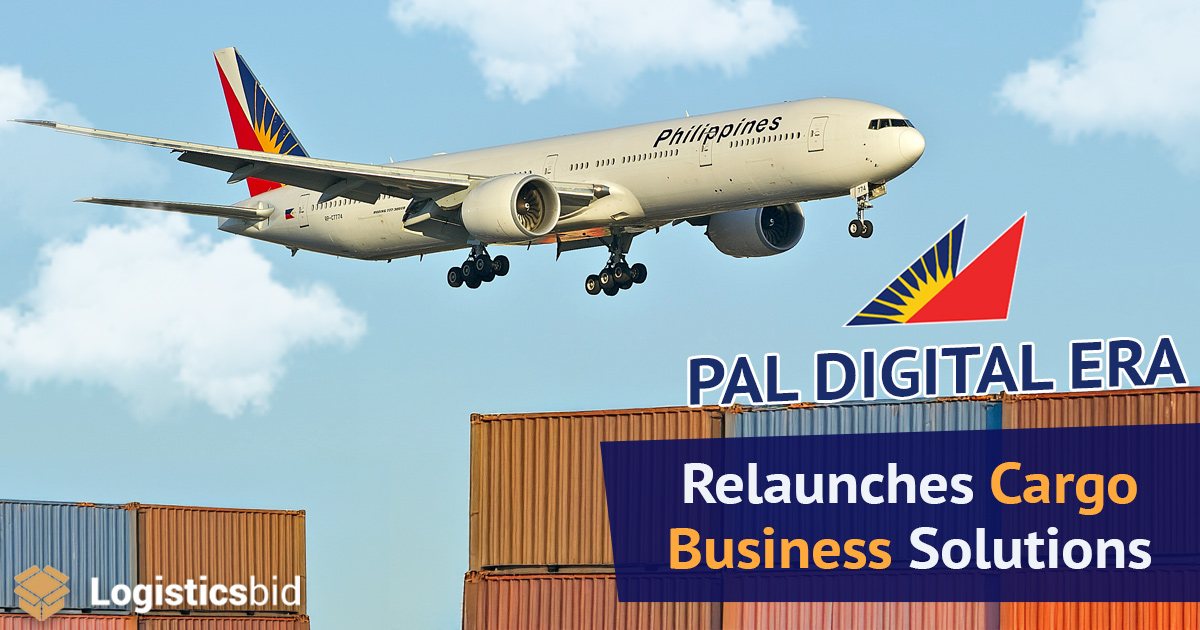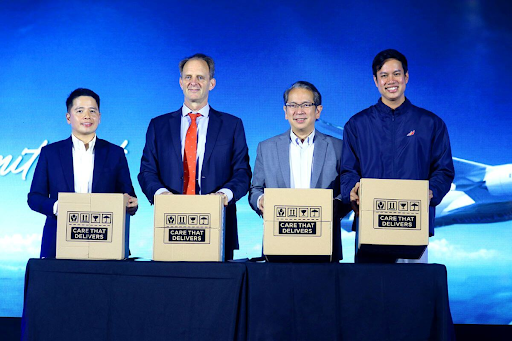
Philippine Airlines (PAL) has officially announced that it is rebranding its cargo division to PAL Cargo. This marks an essential change in its logistics services. It demonstrates the airline’s commitment in its digital era to supporting local entrepreneurs and addressing the evolving needs of the digital-first economy.
What Does the Rebranding of PAL Cargo Entail?
The rebranding of PAL Cargo is not just a name change; it shows a shift toward innovation and customer-focused logistics business solutions. Jason Siy, Philippine Airlines’ Vice President for Cargo, explained this vision by saying, “In today’s digital-first economy, our refreshed business demonstrates PAL Cargo’s support for digital innovation, wider reach, and customized logistics solutions that help local entrepreneurs grow and compete in both local and global markets.”

(From left) PAL executives Jason Siy (VP for cargo), Richard Nuttal (president), Atty. Carlos Luis Fernandez (EVP and COO), and Alvin Miranda (VP for marketing) unveiled the new PAL Cargo to media and industry partners at PAL Headquarters’ Multipurpose Hall in Pasay City. (Source: InsiderPH)
Comprehensive Freight Services
PAL Cargo caters to a diverse clientele, offering a range of freight services tailored to the needs of individuals, freight forwarders, and corporate clients. The cargo division handles various types of goods, including:
- High-value commodities
- Pharmaceuticals
- E-commerce products
- Perishables
Adhering to International Standards
PAL Cargo adheres to strict handling practices that meet the International Air Transport Association (IATA) standards, particularly for sensitive cargo such as pets and valuable items. These important shipments are loaded last and offloaded first at their destinations to ensure maximum security. Additionally, dedicated security teams are assigned to charter flights to ensure overall safety.
Collaborating for Greater Reach
To support its goal of helping local businesses, PAL Cargo has formed partnerships with companies like Airspeed and the Department of Trade and Industry (DTI). These collaborations aim to simplify the shipping process for small business owners in the Philippines, whether they are shipping within the country or internationally.
Siy highlighted the value of these partnerships. He stated, “Through partnerships and our growing cargo network, we aim to support both local entrepreneurs and the Philippine export industry. Even in places we don’t currently serve, our global partnerships let us extend our services and connect their businesses to the world.”
Enhancing Digital Services and Logistics Solutions
As part of its digital transformation, PAL Cargo is developing a mobile-friendly platform to enhance its online services for international cargo. A new Port-to-Door delivery service is also about to launch, going beyond traditional airport-to-airport transport services.
PAL Cargo is also integrating its Mabuhay Miles program, which lets customers earn reward miles through their cargo transactions. This is a unique offering that adds value for frequent users.
An Expansive Network for Efficient Logistics
The main cargo terminal for PAL Cargo is at Ninoy Aquino International Airport (NAIA) in Manila. It gets support from major cargo hubs in Clark, Cebu, and Davao. This robust network enables Philippine Airlines to provide efficient logistics solutions to customers across the archipelago and beyond.
The revitalization of PAL Cargo reflects a larger trend in the logistics industry. Digital transformation is essential for staying relevant and competitive. By focusing on innovation, building strategic partnerships, and enhancing customer service, Philippine Airlines aims to support the growth of Filipino businesses in both local and international markets. PAL Cargo has positioned itself as a forward-thinking leader committed to meeting the needs of its diverse clientele while ensuring safety and efficiency.
With these initiatives, PAL Cargo is not only improving the logistics experience for its customers but also contributing to the growth of the Philippine economy. Stay tuned for more updates as Philippine Airlines continues to evolve in this changing digital era.
The Importance of Digital Transformation in Logistics
Digital transformation is now essential. It drives success in the logistics sector. With the growth of e-commerce and shifts in consumer behavior, businesses must utilize technology to streamline operations and enhance customer experiences. PAL Cargo’s focus on creating a mobile-friendly platform and improving digital services shows its proactive response to market demands.
Key Digital Trends Influencing Logistics:
- Automation: Implementation of AI and automation can increase efficiency, reduce human error, and streamline processes.
- Data Analytics: Leveraging big data enables businesses to make informed decisions based on real-time insights into shipping and inventory management.
- Customer Engagement: Technologies that improve communication and engagement with customers enhance satisfaction and loyalty.
Sustainability Practices in Logistics
In an era where sustainability is becoming increasingly important, Philippine Airlines must consider incorporating eco-friendly practices into its operations. Sustainable logistics not only helps with environmental issues but can also improve a company’s reputation and customer loyalty. Here are several sustainability initiatives PAL Cargo could consider:
- Optimizing Delivery Routes: Implementing route optimization software to minimize fuel consumption and reduce carbon footprint.
- Eco-Friendly Packaging: Transitioning to biodegradable or reusable containers to minimize waste.
- Energy-Efficient Transportation: Exploring partnerships to incorporate electric vehicles or more fuel-efficient transportation options.
Customer Experience as a Competitive Edge
Aligning its services with the unique needs of customers, Philippine Airlines can establish itself as a preferred partner for businesses seeking reliable logistics support.
Strategies to Enhance Customer Experience:
- Tailored Business Solutions: Developing customized logistics solutions based on customer preferences and industry demands can lead to higher satisfaction levels.
- Transparent Tracking Systems: Offering advanced tracking systems that keep clients informed about the status of their shipments can build trust and accountability.
- Responsive Customer Support: Establishing dedicated support teams to efficiently handle inquiries can significantly enhance the overall customer experience.
SEE ALSO:
- Second-Hand Car? Transfer Ownership Within Days
- Philippines’ Logistics Industry: 11% Growth in Three Months
- Common Inquiries About Transportify: What Every Driver Should Know
Other Key Players with Cargo Business Solutions
The cargo logistics sector includes various key players that facilitate the efficient movement of goods. Notable among them are:
1. DHL Supply Chain
 |
A subsidiary of Deutsche Post DHL Group, specializing in integrated logistics solutions including contract logistics and transportation.
2. FedEx
 |
Known for express shipping services, FedEx offers real-time tracking and logistics solutions for businesses and individuals.
3. UPS (United Parcel Service)
 |
UPS is major global logistics provider that offers freight shipping, parcel delivery, and supply chain management with an emphasis on sustainability.
4. Maersk Line
 |
Maersk is one of the largest shipping companies globally, specializing in container shipping and freight logistics to support international trade.
5. Transportify
 |
Emerging in the logistics-on-demand sector, Transportify offers a platform for same-day and next-day delivery services, catering to both businesses and consumers.
